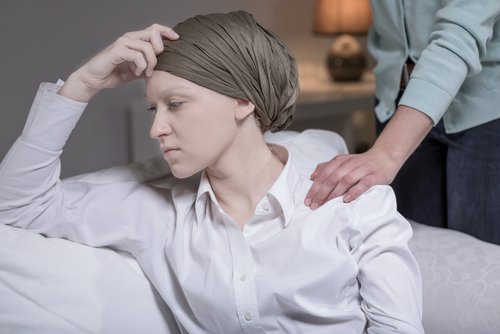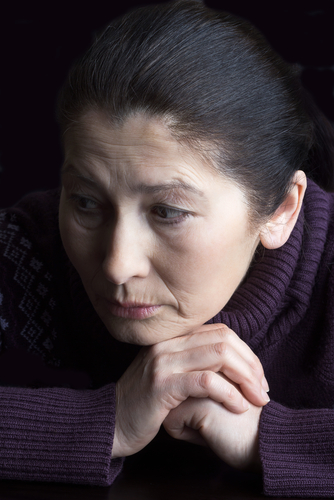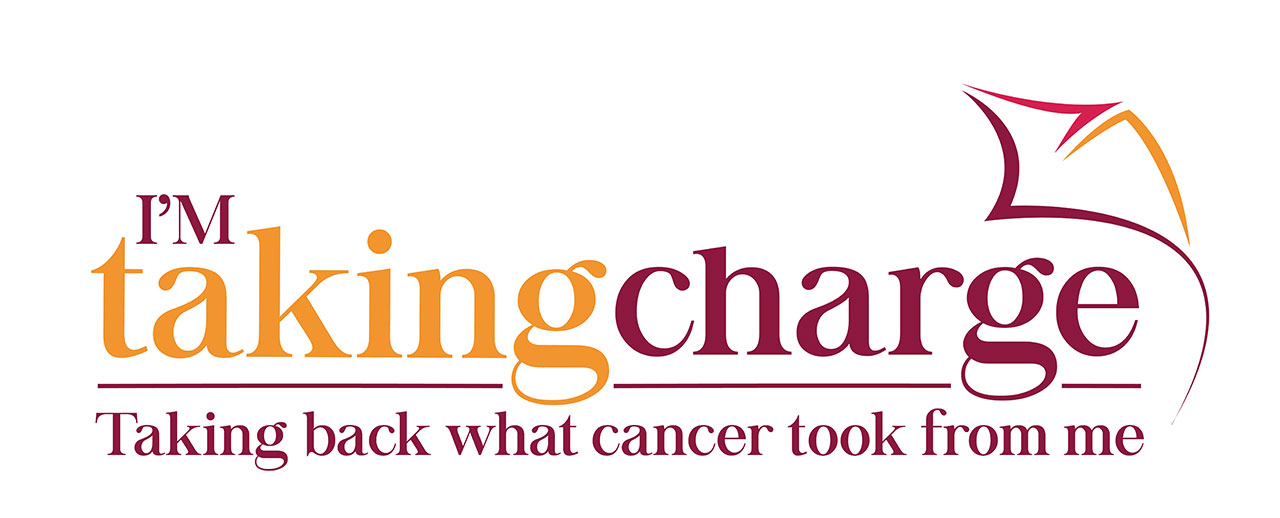Losing a breast is a risk that is unique to women who have or may develop breast cancer. It is often categorized as a unique experience that elicits a unique grieving experience. However, the brain actually reacts to breast loss as it does with any loss or other crisis.

We experience grief after losing a pet or family member, when a child moves away from home, or after a major life change. Breast loss due to mastectomy is a major life change. It is hugely impactful for many women. You may wonder how your spouse might react to the breast being gone. You may worry about how you will cope with the loss yourself. By understanding the normal stages of grief, you can help yourself gradually progress through your sadness after losing your breast.
But, grief is different for everyone.
Although we will provide you with information about the normal stages of grief, along with some things you can do to help during your grieving process, there is no set way for you to move through the stages. Nor is it necessary for you to experience each and every stage. Sometimes, your period of grief can end seemingly overnight. Other times, it may last several months or make regular appearances from time to time.
As you grieve your own loss, remember that time does make loss easier and that there is no right or wrong way to feel sadness and grief.
The Five Stages of Grief
In most cases, the grieving process begins when you first learn that you may need a mastectomy. The process often continues until after the procedure is over. Within the mental health world, there are five basic stages of grief that are generally accepted: denial, bargaining, depression, detachment, and acceptance. These stages can arise during any type of loss, including the loss of a breast, and often continue for an indeterminant amount of time.
We discuss each stage in more detail below.
Again, keep in mind that although we talk about each stage in an order that may make chronological sense, there is no “normal” order when it comes to real grief. Your personal experience may take you through the stages in a different order than others. This is still completely normal.
Denial

During the denial stage, you may feel a range of emotions, from shock and numbness to just plain disbelief. This is a normal way for the mind to protect you against the harsh truth of reality. Rather than forcing you to deal with the loss your breast all at once, the denial stage allows you to gradually process the loss or potential loss. It gives you the time to work through the details without the roller coaster of emotions.
The denial stage can present itself in a variety of ways. For some women, they may separate themselves from the breast cancer and think about it as something that happens to other women, not to them. Meanwhile, other women may simply deny that their physician is talking about them; that when they discuss a mastectomy, it is in relation to somebody else entirely.
Bargaining
As you move into the bargaining stage, you will likely experience such things as confusion and anger. This stage is characterized by intense emotions that arise as you begin to acknowledge the facts regarding your looming mastectomy or loss of your breast. You are likely to blame yourself or feel anger towards your physicians or any religious deity you believe in. Additionally, you may express anger towards your family members because their genes played a role in what happened to you.
It is common during this stage to consider what role you played in the eventual loss. Did you cause the breast cancer? Would doing something differently have saved your breast? Why did you deserve to get breast cancer? These questions and more are all common during the bargaining stage. In an attempt to fix your perceived wrong-doing, you might even make unrealistic mental promises. These promises may come in the form of agreeing to change a certain behavior as long as your breast is saved.
When you continue through this stage, you may also notice some physical changes caused by the additional stress, including neck and shoulder pain, fatigue, or constipation. Headaches and stomachaches are also common as your body reacts to the emotions you are feeling.
Depression

In the depression stage of grief, you will start recognizing the true extent of the loss. Similar to the bargaining stage, you will be met with a variety of emotions, many of which are negative. Because of these negative emotions, you are likely to retreat within yourself in an attempt to cope. You might feel lost, lonely, and isolated. Meanwhile your body will react to the emotions by having less energy during the day, a smaller appetite, and sleeping problems.
This stage can also include feelings of disorientation, especially in the case of losing your breast. If you experience this stage after your mastectomy, then these feelings can be amplified. As your chest starts healing, you may feel disoriented due to the different clothes that you can wear, lack of trust in your own body, or feelings of being incomplete. Many women experience anxiety or confusion when first leaving the house after having a mastectomy. These feelings often subside with time as your become more comfortable with your new self.
Detachment
It is common for women to detach themselves from their emotions while grieving. You may find that being apathetic and away from others makes it easier to deal with the wave of emotions you’re facing. By isolating yourself, you are giving your mind the break it needs to absorb the loss fully. Instead of having to balance your responsibilities at work and in various relationships, you can simply focus on losing your breast.
You are giving yourself time to accept that what is happening will change your life forever.
However, it is important to still maintain some contact with others. It’s completely normal to separate yourself from others during this tough time, but too much isolation can increase feelings of loneliness or helplessness. So, if you are dealing with this stage, try to still connect with some people as you cope with your loss.
Acceptance

The acceptance stage is most often the final stage of grief. Reaching this stage does not mean you have to be happy about losing your breast. It simply means that you can recognize that you do not need your breast to rediscover happiness. You have accepted your new body and have found organization in your life once again.
Acceptance can come in waves or all at once. You might wake up one day and realize that you are feeling happiness again. Or you might spend a few months balancing your grief and the advantages of how your body has changed. Although the acceptance stage can start at any point during the grieving process, it is still the last stage that you often end on. To reach it, you must allow yourself to experience any other stages of grief that arise.
Many women take their newfound joy and try to spread it to others during the acceptance stage. Once you learn to love yourself again, you may have the desire to volunteer at breast cancer support organizations or other charitable organizations. This is a great way to continue your healing process and can help ensure you stay ahead of any recurring moments of sadness.
Coping As You Grieve
You understand the stages of grief after losing your breast, but how can you ensure that you move past all the necessary stages?
Fortunately, there is a lot you can do that helps as you process your loss.
Since some stages include a desire to be alone, we’ve included things you can do that involves just yourself and other people. This way, you always have a few options regardless of which stage you are struggling through.
Let Others Help You

You may not be used to accepting the help of others. However, opening yourself up to it can really help as your mourn the loss of your breast. Do you live alone or have a spouse or family to take care of? Regardless, things are probably going to get pretty hectic, pretty fast at home. Your spouse or older children can help take on some chores. There still may be a huge gap between what needs to be done and what realistically can be done as you take a break to process your loss.
Because of this, accepting the help of friends or neighbors may be extremely valuable. They can help with everyday responsibilities such as grocery shopping or preparing meals. Or perhaps they would prefer getting together to complete a large project that you have been worrying about. Either way, extra hands around the house give you the time you need to grieve without all the worry about your household falling to pieces.
Lean on Friends and Family
While others can help you with various tasks, your close friends and family are most likely going to be the best source of emotional support. In many other situations involving loss, you would turn to loved ones for support. The loss of your breast is no different. Although some individuals may not fully understand the impact of your mastectomy, it is still important to lean on your friends and family when you know that they will be there to hold you up.
Making new friends during your journey through breast cancer also provides you with additional support. Support groups or just other women that you see getting treatment for breast cancer often have a deeper understanding of what you are going through. This understanding makes it easier for them to empathize and it may make you more comfortable about opening up.
If you would like to read more about support groups, please check out our previous post about the topic.
Try Therapy for Breast Loss
One-on-one therapy sessions are great for dealing with the sadness, fear, and depressed moods that are all common following the loss of a breast. With the exception of very rare circumstances, therapists must keep your information private. These private therapy sessions ensure that your emotions and feelings are kept between just your and your therapist. For many women, this extra bit of security can help them feel free to truly open up about how they are coping.
Ultimately, therapy can also provide you with more in-depth ways to cope and work through your grieving process. Since you will be sharing your personal struggles, your therapist will be able to provide you with various tasks or tools that can help during any stage you may feel stuck in. They may also be able to alleviate concerns you may have about being in a particular stage for too long.
We also have a previous post about counseling and therapy for breast cancer. Feel free to check that out here.
Finally, here are a couple independent ways for you to cope.
Think Positively

Thinking positively may sound more cliche than anything. But the way you think about things actually has huge impacts on how you ultimately feel. You will likely experience feelings of having no control over your own live or that you somehow caused the loss you are now coping with. The future is always unclear and this very fact may be a source of your anxiety and worry.
Instead of focusing on what you couldn’t control, think about the things you do still control. You get to choose how you think following your loss. And you get to control how you are going to go through the rest of your life.
Unfortunately, just thinking differently is not always enough.
Think about keeping a journal of your thoughts and feelings. By doing this, you are still clearing your head of the negative thoughts you have without actually talking to anyone. Beyond that, you can try meditation to clear your mind and promote relaxation. This can be especially helpful for women struggling with poor sleep.
Do What You Love

As you face this major change in your life, you may notice that other areas of your life are also changing. Many times for the better. As you grieve, you may realize that you have always had an interest in something. Yet you always seemed to talk yourself out of trying it in the past. Rather than continuing to talk yourself out of it, just try it. Taking the time to enjoy personal interests you have automatically improves your mood because you are accomplishing things that you love.
You don’t always have to try something new, either. If you have a love of reading, for example, take the extra down time during your grieving to allow yourself to get lost in another world. Or, if you love volunteering, spend some extra time helping others. Doing things you love helps you get back to your normal daily schedule. And getting back to your normal life really helps you get through your grief.



![Why Is Forgiveness So Important to Cancer Patients? [Podcast Ep. 26]](https://imtakingcharge.com/wp-content/uploads/2018/08/shutterstock_1008129595-500x383.jpg)
![How to Piece Together Your Post-Cancer Life [Ep. 24]](https://imtakingcharge.com/wp-content/uploads/2018/07/Optimized-chuttersnap-478260-unsplash-500x383.jpg)

![Sorting Body Image Issues After Breast Cancer [Podcast Ep. 23]](https://imtakingcharge.com/wp-content/uploads/2018/07/shutterstock_1062595838-500x383.jpg)
Leave A Comment